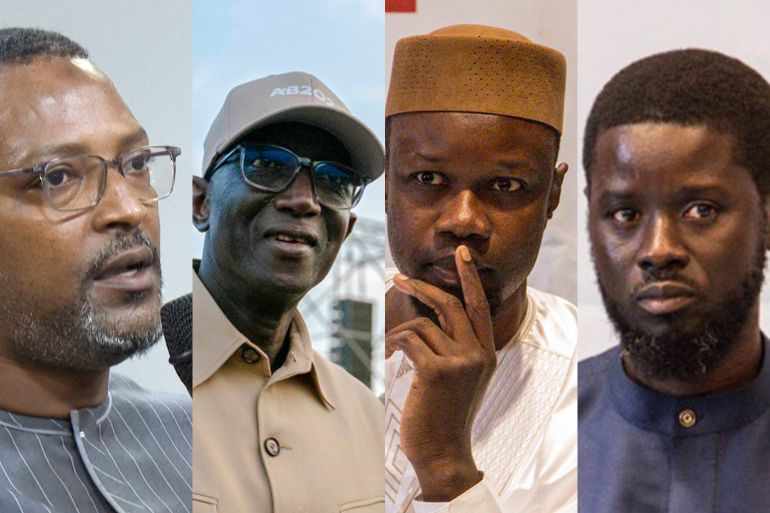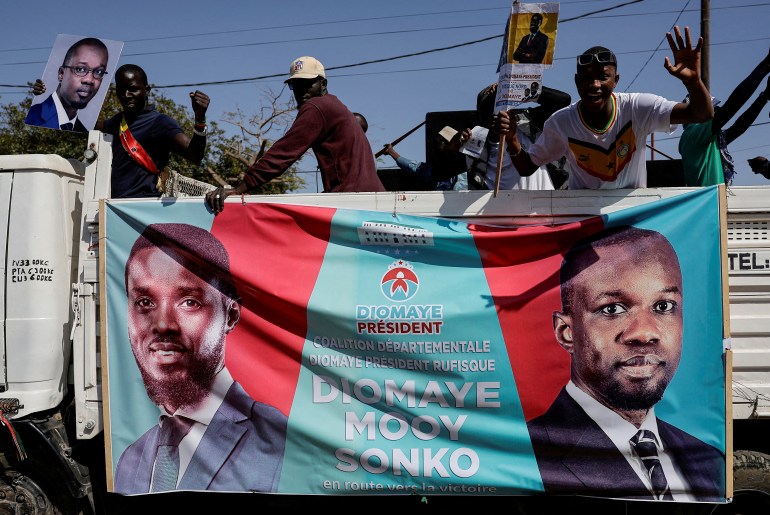The tax inspectors competing to be Senegal’s new president
Three candidates and one former favourite for the office of president have tax inspector backgrounds.

Dakar, Senegal – Trust and power seem to converge in the hands of tax inspectors in Senegal, as the country is ready to vote in a highly anticipated presidential election on Sunday.
The political figures receiving the most attention out of 17 presidential hopefuls during this electoral cycle – candidates Amadou Ba, Bassirou Diomaye Faye, Mame Boye Diao, and former favourite for office, Ousmane Sonko – are all current or former tax inspectors.
Keep reading
list of 4 itemsJobless engineers, MBAs: The hidden army of Indian election ‘consultants’
Focus on southern states as India votes in second phase of mammoth election
North Macedonia votes in presidential polls as EU membership bid looms
For many, it is a simple coincidence, their earlier professions having no bearing on their selection for candidacy. But for others, their perceived wealth and financial savvy make a difference.
To participate in the presidential election, you need the financial means to do it, explained Alioune Tine, a prominent Senegalese political analyst, highlighting that the four figures are the most apt among public administration to participate in the presidential elections thanks to their wealth.
“Financial power looks for political power,” said Tine. “They are often richer than people in the private sector.”
For some voters, the candidates’ background is important as it inspires trust and competency.
Ousmane Guisse, a 37-year-old insurance broker and Ministry of Commerce employee, is planning on voting for Ba, a former prime minister, due to the fact that he proved himself by climbing up the ladder of meritocracy.
“Mr Ba isn’t just a simple inspector like Faye, Sonko or Diao,” said Guisse. “He’s a former director general who has worked his way up to the top.”
Ba was once the director of the Directorate General of Taxes and Estates and was the minister of economy under two governments. Now, he is the presidential candidate of outgoing President Macky Sall’s party, the Alliance of the Republic.
Diao – who belongs to the same party as Ba and incumbent Sall – was the director of the Deposit and Consignment Fund in Senegal and most recently mayor of Kolda, a city in the south of the country, since January 2022.
He has decided to not back Ba, the party’s favourite, in this election and run his own campaign instead under a different party called the Coalition for a New Senegal.
Meanwhile, Sonko, a controversial but also venerated opposition figure, was barred from running in the elections after facing sexual assault and libel charges. Former mayor of the southern Senegalese city of Ziguinchor and a former tax inspector who investigated the government’s gas and oil deals with foreign companies, he rose to prominence as the leader of the Pastef party. The coalition was dissolved in 2023 after Sonko was arrested and accused of inciting riots around the country.
Sonko, together with Faye – also a tax inspector and a favourite in the elections – now lead the opposition party formed out of the syndicate of tax and estate agents they led.
The four men are all vouching to change the country and fight for the people. Either part of the establishment or challenging it, the current or former tax inspectors seem to have coalesced the trust of the people, whether independent of their background or not.

Old vs new guard
Guillaume Soto-Mayor, a nonresident scholar at the Middle East Institute, told Al Jazeera that the reputation of tax inspectors can be beneficial but also harmful.
Sonko and Faye are seen as embodying another vision of the tax inspector, one that serves the law and its applications for anyone, no matter their wealth, origins or family ties. Meanwhile, Ba is seen as part of the old guard, reinforcing the same alliances and interests that have dominated Senegal for the past two administrations.
“[Faye and Sonko] incarnate a counter-image of the traditional corrupted, nepotic and kleptocratic administrative figures,” said Soto-Mayor.
On the other hand, explains the scholar, tax collectors are also disliked by some factions of society as the most hated administrative figures as they impede citizens from having thriving businesses and accumulating personal wealth.
Being a tax inspector is seen as “the quickest way to become a millionaire”, according to Soto-Mayor, who believes Senegalese citizens see it as a corrupt position.
Pathe Thiam, a 22-year-old Senegalese student, told Al Jazeera that for him, tax inspectors represent a “certain elitism that is rife in the country because these inspectors were trained in the most prestigious schools and are often colleagues, friends and relatives”.
For Thiam, this raises questions about corruption, because all of the inspectors among the candidates, with the exception of Faye, refuse to make their asset declaration and explain the origin of their campaign funds.
“They have politicised their function, thus forgetting their duty to the republic,” said Thiam.
For other voters, like Vieux Aidara Moncap, a France-based activist for Sonko and Faye’s coalition party Pastef, the role of tax inspector has “absolutely nothing to do with” why certain figures have been selected to represent political parties.
Rather their policies and positions as leaders of the parties, thinks Moncap, are more relevant factors as to why they have been chosen.